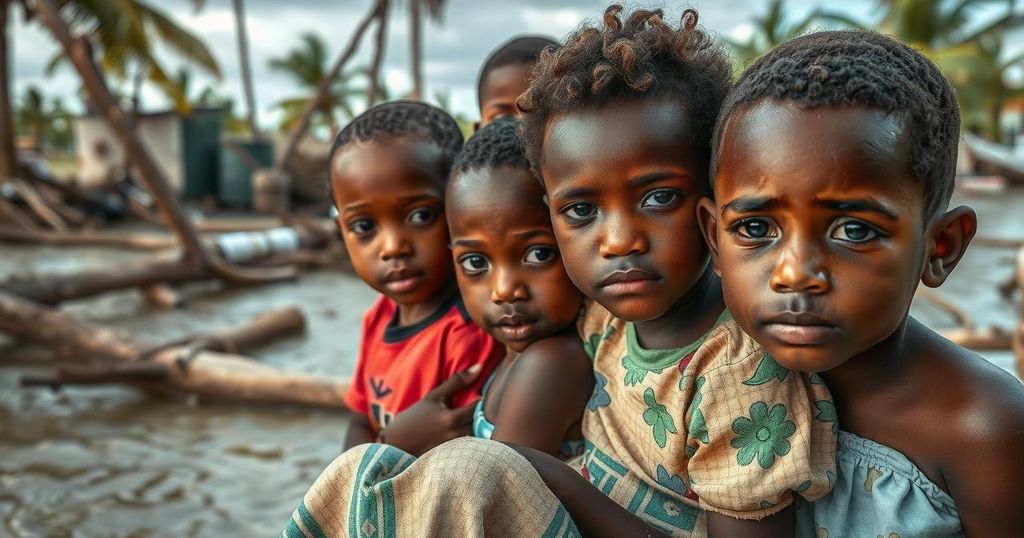Cyclone Chido has devastated northern Mozambique, impacting approximately 90,000 children and destroying over 35,000 homes. The storm has led to significant infrastructure damage, affecting education and healthcare, and exacerbating existing health crises. Humanitarian responses are being mobilized, although challenges persist due to limited supplies. The cyclone has also affected surrounding areas, highlighting the ongoing vulnerabilities faced by local communities.
Cyclone Chido recently struck northern Mozambique, resulting in widespread destruction, particularly in Cabo Delgado province. UNICEF reported that approximately 90,000 children were significantly affected. The cyclone led to the obliteration of over 35,000 homes and the disruption of vital services, including schooling and healthcare. Overall, around 174,000 individuals have been affected, and these figures may rise as assessments progress. The storm wreaked havoc, damaging electricity and communication infrastructures and washing away what few resources displaced families had managed to rebuild after years of conflict in the region.
In addition to the destruction in Cabo Delgado, Cyclone Chido impacted areas in Nampula and Niassa provinces, leaving thousands of families without electricity and access to clean water. This catastrophe exacerbates an already critical health crisis, as the region grapples with a cholera outbreak. WHO experts are on-site to assist local authorities in addressing immediate health needs.
UN agencies and local partners have begun distributing emergency relief. Within 48 hours post-cyclone, the UNHCR managed to provide aid to over 2,600 individuals in Pemba, including essential items such as blankets and mosquito nets. Estimates suggest that around 190,000 people in rural areas urgently require humanitarian assistance, with significant impacts reported in schooling and housing.
UN Secretary-General António Guterres confirmed that UN teams are assisting with emergency aid and are prepared to extend additional support as necessary. However, the response is currently hampered by limited supplies, prompting an allocation of $4 million for immediate humanitarian efforts. Additionally, the World Food Programme has announced plans to intensify its support for those most affected by the cyclone.
Other areas, including Mayotte and southern Malawi, also experienced significant damage due to Cyclone Chido, with increasing risks posed to vulnerable groups such as refugees and asylum seekers. The situation across the impacted regions remains fluid, and ongoing assessments are paramount to addressing the extensive humanitarian needs emerging from this disaster.
Cyclone Chido is among the latest in a series of extreme weather events exacerbated by climate change that have affected Mozambique. The country struggles with various crises, including conflict, drought, and health emergencies, making children particularly vulnerable. Humanitarian assistance in these regions is urgently needed as communities rebuild from years of instability. This cyclone has further strained resources and highlighted the ongoing challenges faced by affected populations, especially in education, health, and basic infrastructure.
In conclusion, Cyclone Chido has inflicted considerable damage on northern Mozambique, severely impacting thousands of children and families. The storm has left communities without shelter, clean water, and access to education and healthcare, creating an urgent humanitarian crisis. Collaborative response efforts are underway but face challenges due to limited resources. The ongoing need for assistance is critical, especially as Mozambique deals with the long-term implications of climate change and protracted conflict, which exacerbate vulnerabilities.
Original Source: news.un.org







